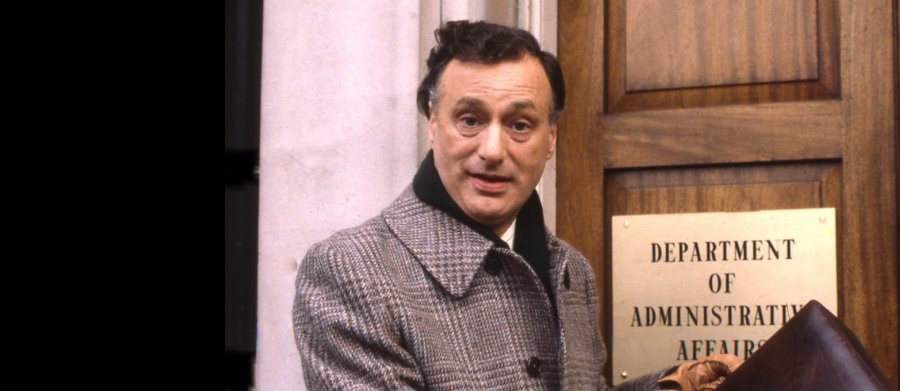
Paul Eddington
Biography: Brian Slade
In 1975, John Howard Davies began casting for a show far ahead of its time about a couple trying to live a more environmentally friendly lifestyle from the heart of Surbiton. For the role of Jerry Leadbetter, they turned to an actor who had to this point struggled to persuade any television producer that he could carry off comedy acting in front of a live studio audience. The laugh would be on them, as Paul Eddington would become a household name for his roles as hen-pecked hubby Jerry to Penelope Keith’s Margo in The Good Life, and subsequently as Jim Hacker in the hugely successful political sitcoms Yes, Minister and Yes, Prime Minister.
Eddington was born in 1927 and had what for most would be considered a troubled childhood. His parents split during his younger days and in an effort to chase job opportunities, his mother took Eddington and his sister around the country, wherever work could be found. By the time he completed his education, he estimated that he and his sister had had to adjust to sixteen different schools.
Wartime saw little improvement in Eddington’s childhood. Diagnosed with clinical undernourishment and TB, he somehow maintained a mild-mannered acceptance of the circumstances of youth, bar an abhorrence of bullying, something which he said could turn him from ‘an entirely non-violent person into someone highly combustible.’ That anti-violence approach came from a largely Quaker upbringing. It was during his transition from schoolboy to adult that he decided that acting should be his vocation, tiring as he was of working for Lewis’s department store in Birmingham.
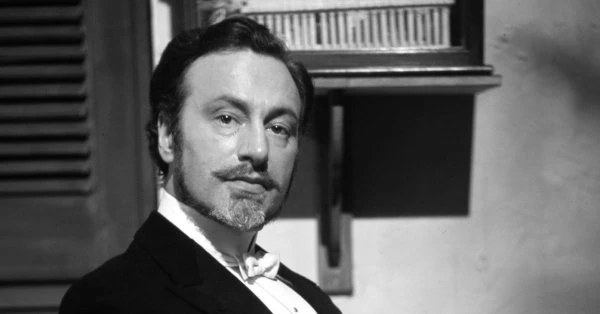
The young Eddington took a somewhat simplistic approach to getting into acting. With no family money to pay for training, he simply arrived at the doorstop of the Crescent theatre company and announced to the person opening the door that he wished to become an actor. While the intentions of the person welcoming him in were questionable, Eddington spending much time as a mere ornament within the theatre bar, he did get some good advice from an acting couple who suggest he try the Entertainers’ National Service Association. The ‘I wish to be an actor’ approach worked again and he joined his first company, taking a part in a production of Jeannie in Colchester.
As a conscientious objector, Eddington was unable to continue with his company’s tour. As they headed to the Far East, he remained to face a tribunal. While convincing a judge that he was a conscientious objector, Eddington’s role on the tour with ENSA had gone and he now found himself unemployed.
Joining Birmingham Rep, Eddington was back on stage appearing in productions of The Tempest and She Stoops to Conquer. After several years he found himself struggling for a breakthrough role and feeling that his lack of formal acting training was holding him back, Eddington successfully auditioned for RADA. His first television role came in Yellow Sands, but he then found regular paid work by joining the cast of Robin Hood, with Richard Greene as the lead, and he would gain further regular paid work in Kenilworth as a swashbuckling cavalier.
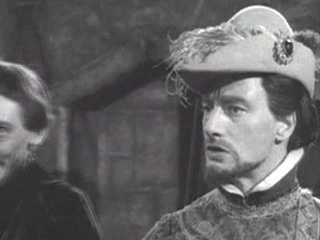
More sustained acting jobs, despite his skills, were hard to find. The breakthrough role he craved was not forthcoming, and Eddington even contemplated quitting acting when the offer to work for Shell surfaced. Thankfully a threat from his wife Patricia to leave him if he quit acting convinced him to continue his chosen profession.
After years of regular if unspectacular work, a role in Alan Ayckbourn’s Absurd Person Singular led to the breakthrough that Paul had craved. Eddington admitted that his television work had been all drama, his stage work mostly comedy, and success the like of which he craved would only come when somebody would cast him in a successful television comedy. The person to take that leap of faith would be BBC producer John Howard Davies, who saw Eddington in Absurd Person Singular and loved what he witnessed. He promptly cast Eddington in The Good Life.
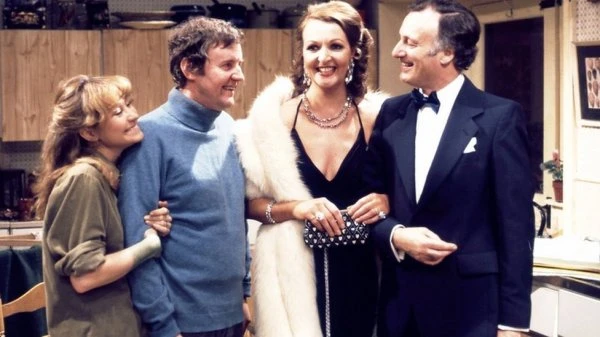
Jerry Leadbetter, with his wife Margo, lived next door to Tom and Barbara Good. The Goods were determined to lead their lives in as self-sustaining way possible, directly at odds with their neighbours who carried a certain social standing and demanded the finer things in life that such standing dictates. In the first series, Jerry and Margo are initially little more than extras – indeed in the first episode, Penelope Keith is only heard, but not seen. But such was the comedy value of the Leadbetters that the writers began to realise that what may have started as a comedy about two should really become one about four.
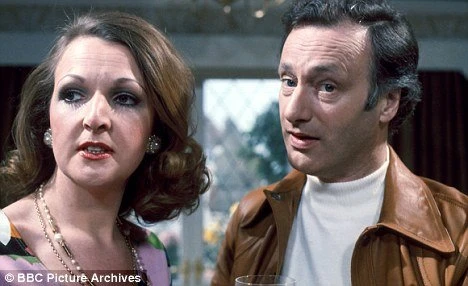
While people happily recall Keith’s Margo dressed in hat and mac tiptoeing around the Good’s muddy garden, or refusing to wear a Christmas hat made from newspaper because it was folded from pages of the Daily Mirror, Eddington’s portrayal of Jerry gives a greater understanding of the Leadbetter household. Margo is all about social positioning and dominates Jerry, but Jerry, while bemused at some of the goings on in the Good household, loves nothing more than to break the shackles imposed by his wife and join in the merrier moments of his neighbours’ lives.
The Good Life was and remains a remarkable entry in British comedy history. All four of its leading performers excelled and the show ran around the world and still does today. Ordinarily, a performer who struck comedy gold as comparatively late in his career as Paul Eddington would be considered blessed to have found such a role as Jerry. But amazingly, his finest hour was yet to come.
With The Good Life now over, John Howard Davies was again instrumental in Eddington’s next step. He brought the script of the pilot episode of Yes, Minister to Eddington, a new comedy about the relationship between a minister and his senior civil servant adviser. Writers Jonathan Lynn and Anthony Jay wanted Eddington for Jim Hacker, the well-meaning but rather bemused minister. Eddington was not convinced. He asked for further scripts to be written before committing himself, fearful that the show was a big step away from traditional sitcom, and a failure could seriously damage his career. He was also more keen on the role of Sir Humphrey Appleby, the acid-tongued sparring partner who closed every episode with the titular line, ‘Yes, Minister.’
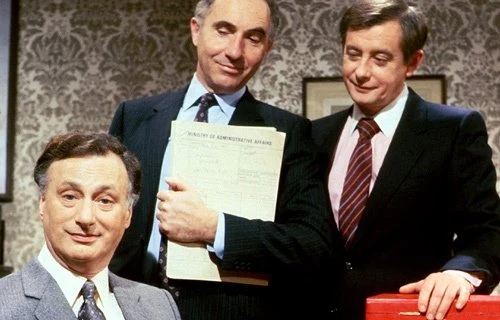
Eddington eventually conceded to do the show, and he later said of his uncertainty, ‘When I think now how nearly I came to rejecting Yes, Minister, my blood runs cold.’ The programme was a runaway success. It was notoriously a favourite of then Prime Minister Margaret Thatcher and brought BAFTA nominations for Eddington and co-star Nigel Hawthorne. Cruelly, Eddington always lost out in the final award verdict. Ironically though, it was the role of Hacker that developed through both Yes, Minister and its successor, Yes, Prime Minister. For the show to work Eddington had to get the balance right between bemusement at Sir Humphrey’s manipulation and deceit but also be believable enough to convince people that Hacker could hold down his role in cabinet and eventually in number 10. He did so to perfection, and as hilarious as Hawthorne’s extended and complicated political explanations are, Eddington’s baffled double-takes give them the reaction to seal the laughter that such fine writing deserves.
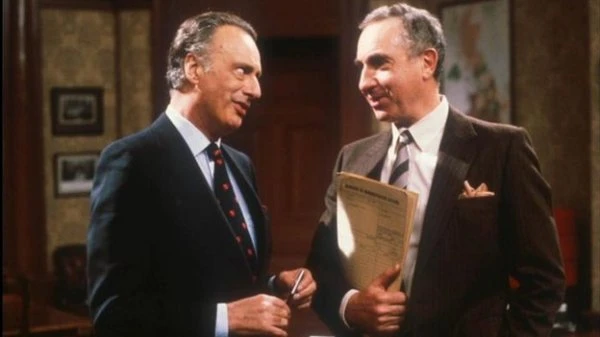
In the later years, health problems that Eddington had been battling for much of his adult life began to cause ongoing issues, unbeknown to theatre and television audiences. As far back as 1958 he had begun to suffer excruciating joint pains from ankylosing spondylitis and while treatment continued and diagnoses differed, he also noticed large red patches on his skin. It was around 1983 while appearing in Charles Dyer’s comedy stage show, Lovers Dancing that he showed the patches to co-star Colin Blakely, who immediately said, ‘It’s something called “mycosis fungoides”.’ It was several years later that Eddington would have that confirmed and he began a stretch of ultra-violet treatment, knowing that Blakely had tragically died.
Attempts at faith healing failed, tried only as an option rather than a refusal of more conventional medical procedures, and Eddington was beginning to realise that he could no longer hide his illness from the public. With the press sharpening their knives for juicy headlines and cruelly stalking their prey, Eddington eventually revealed his diagnosis to the world. Not unsurprisingly, with the potential to break scandal on their terms gone, the tabloids largely lost interest, allowing Eddington the room to face his fate with grace and dignity.
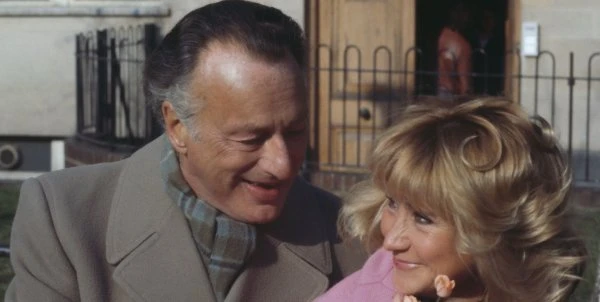
The final television appearance in an acting capacity for Paul Eddington was in The Camomile Lawn, alongside among others his The Good Life co-star, Felicity Kendall. Set at the outbreak of the second World War for four of its five episodes, this hugely successful mini-series achieved viewing figures Channel Four would not eclipse again for one of its own dramas for more than twenty years.
Just days before he passed away, Eddington’s final appearance was made on Face to Face, an extended interview programme with the camera almost entirely focussed on its subject. By now, the effects of his illness meant that it was clear Eddington was not only on borrowed time, but also that he had chosen to fight on and say goodbye on his own terms.
Eddington didn’t consider himself brave in his battle, quite the contrary, believing that if he would choose not to have the illness if he could and that he just had to get on with things. He is renowned for having said once that his epitaph, if he could choose it, would be, ‘He did very little harm,’ believing that to strike a balance as he tried ‘not to sound mock-modest or boastful.’ He did considerably more than that. In Jerry Leadbetter and Jim Hacker, Paul Eddington breathed life into two glorious characters and earned himself a fully deserved place among the nation’s favourite comic actors.
About Brian Slade
Born and raised in Dorset, Brian turned his back on a twenty-five-year career in IT in order to satisfy his writing passions. After success with magazine articles and smaller biographical pieces, he published his first full-length work, `Simon Cadell: The Authorised Biography'.
Brian is a devoted fan of the comedy stars of yesteryear, citing Eric Morecambe, Ken Dodd, Harpo Marx and Dudley Moore amongst his personal favourites. He was drawn to the story of Simon Cadell through not only `Hi-de-hi!' but also `Life Without George', a programme he identified with having grown up in the Thatcher era.
Published on March 28th, 2020. Written by Brian Slade for Television Heaven.









